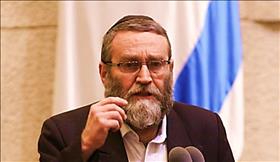Context and more accurate understanding
An increase in Haredi MKs – not in public support.
Hiddush provides context and more accurate understanding of what may appear to onlookers from the Diaspora as growing support for the ultra-Orthodox political parties due to the increase from 13 to 16.
11/04/2019 21:45
Tags: 2019 elections

Moshe Gafni, United Torah Judaism Party; source - Wikipedia
Despite what some may naturally assume, based upon the outcome of the 2019 elections, the reason for the increase in the number of ultra-Orthodox MKs has nothing to do with growing support, but rather with the unique electoral system and specific political circumstances in Israel.
The number of votes that were “lost” by virtue of voting for parties that did not pass the threshold (3.25%) almost doubled from 4.5% to 8.2%, meaning that every single vote that was counted was worth relatively more. Secondly, a Sephardic ultra-Orthodox party that had competed with the Shas Party in the 2015 elections withdrew from the race at the last minute and endorsed the ultra-Orthodox Ashkenazi party, which resulted in its base of support dividing its vote between the two ultra-Orthodox parties. A third factor is the high birthrate in the ultra-Orthodox community, which translates into increasing levels of support.
While it is important that there is no newly found sympathy or support for the two ultra-Orthodox among Israel’s predominantly non-Haredi population, their numbers and political clout are projected to increase unless Israeli political parties break out of the conceptual mold that a Government Coalition cannot be formed without them.
Israel’s best interests require greater willingness on the part of the civil parties to collaborate across the aisle.
Israel’s best interests require greater willingness on the part of the civil parties to collaborate across the aisle, rather surrender so many of Israel’s civil liberties and freedoms to the dictates of the ultra-Orthodox parties. This is widely supported by the public, but rejected offhand by Israel’s politicians.
Lastly, to put the future projections in context, as we have pointed out before, the Central Bureau of Statistics published their population projections through the year 2065, and the middle variant indicates that the ultra-Orthodox population is projected to increase to 32.5% of Israel’s population, compared to its current approximately 11%.